外研版(2019) 必修第一册 Unit 2 Exploring English Understanding ideas Language points课件(20张)
文档属性
| 名称 | 外研版(2019) 必修第一册 Unit 2 Exploring English Understanding ideas Language points课件(20张) |
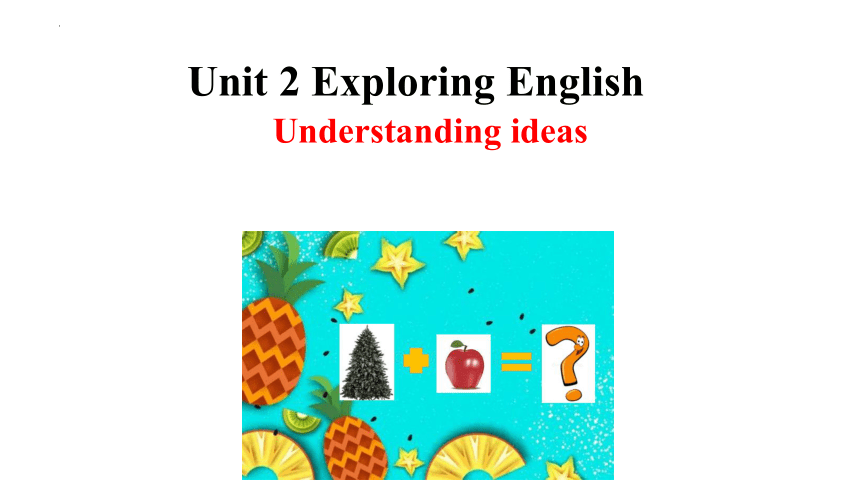
|
|
| 格式 | zip | ||
| 文件大小 | 587.0KB | ||
| 资源类型 | 教案 | ||
| 版本资源 | 外研版(2019) | ||
| 科目 | 英语 | ||
| 更新时间 | 2022-09-01 22:10:31 | ||
图片预览

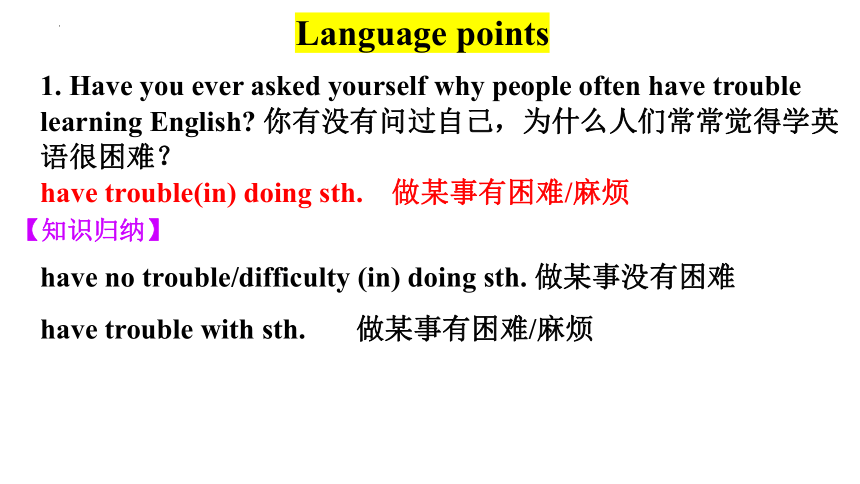
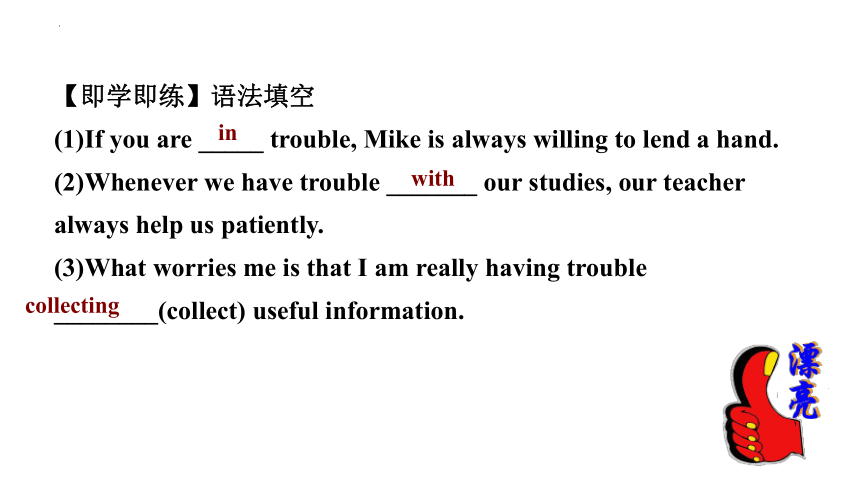
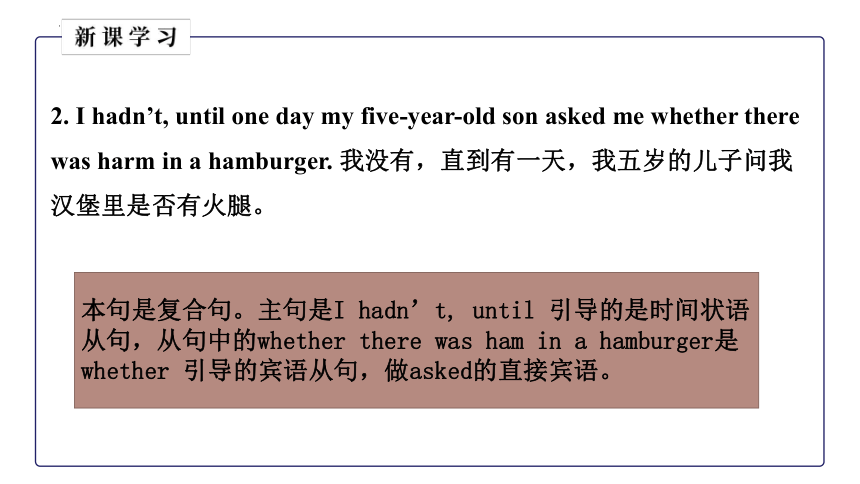

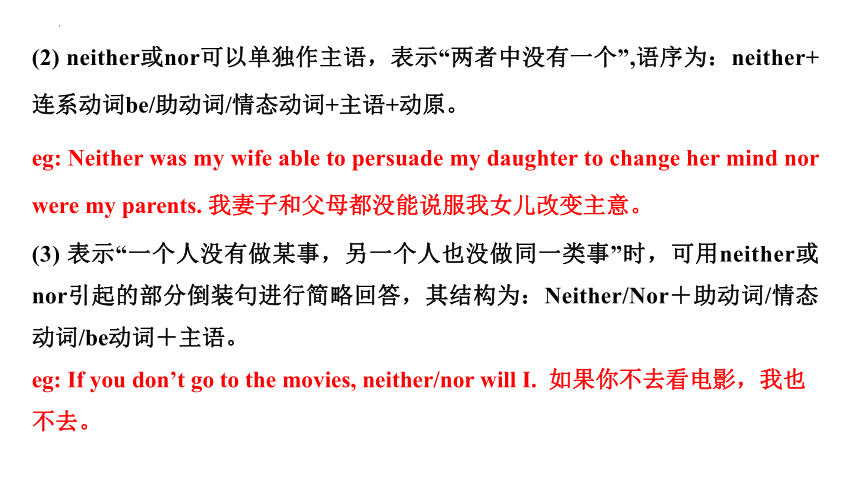
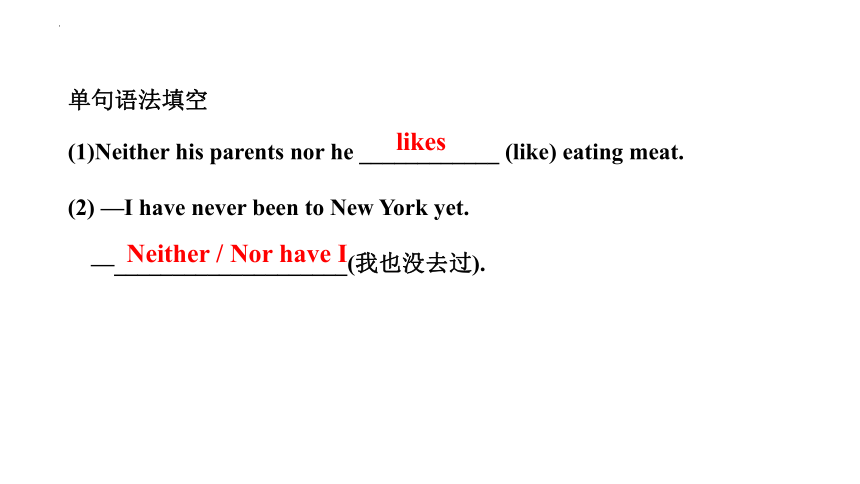
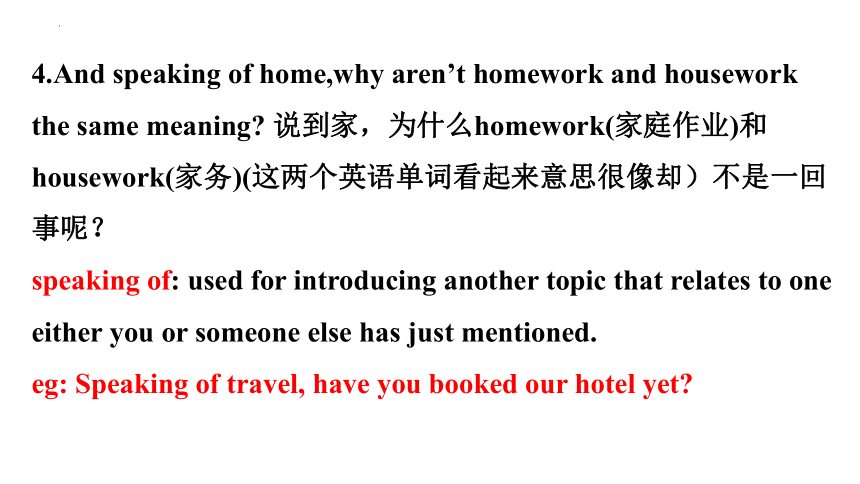
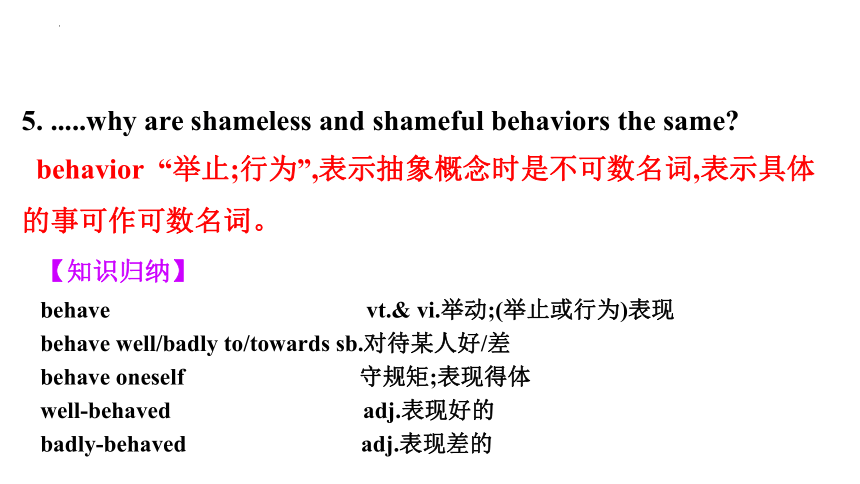
文档简介
(共20张PPT)
Understanding ideas
Unit 2 Exploring English
1. Have you ever asked yourself why people often have trouble learning English 你有没有问过自己,为什么人们常常觉得学英语很困难?
have trouble(in) doing sth. 做某事有困难/麻烦
have no trouble/difficulty (in) doing sth. 做某事没有困难
have trouble with sth. 做某事有困难/麻烦
Language points
【知识归纳】
【即学即练】语法填空
(1)If you are _____ trouble, Mike is always willing to lend a hand.
(2)Whenever we have trouble _______ our studies, our teacher always help us patiently.
(3)What worries me is that I am really having trouble ________(collect) useful information.
in
with
collecting
2. I hadn’t, until one day my five-year-old son asked me whether there was harm in a hamburger. 我没有,直到有一天,我五岁的儿子问我汉堡里是否有火腿。
本句是复合句。主句是I hadn’t, until 引导的是时间状语从句,从句中的whether there was ham in a hamburger是whether 引导的宾语从句,做asked的直接宾语。
3. Neither is there pine nor apple in pinapple.
凤梨里面既没有松树也没有苹果。
(1) neither...nor...连接两个主语时,谓语动词的单复数应和临近的主语一致,遵循“就近原则”。
eg: Neither the students nor the teacher knows anything about it.
(2) neither或nor可以单独作主语,表示“两者中没有一个”,语序为:neither+连系动词be/助动词/情态动词+主语+动原。
eg: Neither was my wife able to persuade my daughter to change her mind nor were my parents. 我妻子和父母都没能说服我女儿改变主意。
(3) 表示“一个人没有做某事,另一个人也没做同一类事”时,可用neither或nor引起的部分倒装句进行简略回答,其结构为:Neither/Nor+助动词/情态动词/be动词+主语。
eg: If you don’t go to the movies, neither/nor will I. 如果你不去看电影,我也不去。
单句语法填空
(1)Neither his parents nor he ____________ (like) eating meat.
(2) —I have never been to New York yet.
—____________________(我也没去过).
likes
Neither / Nor have I
4.And speaking of home,why aren’t homework and housework the same meaning 说到家,为什么homework(家庭作业)和housework(家务)(这两个英语单词看起来意思很像却)不是一回事呢?
speaking of: used for introducing another topic that relates to one either you or someone else has just mentioned.
eg: Speaking of travel, have you booked our hotel yet
5. .....why are shameless and shameful behaviors the same
behavior “举止;行为”,表示抽象概念时是不可数名词,表示具体的事可作可数名词。
behave vt.& vi.举动;(举止或行为)表现
behave well/badly to/towards sb.对待某人好/差
behave oneself 守规矩;表现得体
well-behaved adj.表现好的
badly-behaved adj.表现差的
【知识归纳】
【即学即练】语法填空/完成句子
(1)People with autism(自闭症) often have a lot of respective __________(behave).
(2)I think all of us should mind our ________(behave) in public places.
(3)Behave _______(you) in public, and you win the respect of most of us.
(4)When children _____________,we say they are like angels.
当孩子们表现良好时,我们说他们就像天使一样。
behaviors
behavior
yourself
behave well
6. ....why are “hardly” and “softly” not an opposing pair
opposing adj. (观点、意见等)相反的,对立的
oppose v. 反对;对抗;使对立
opposite n. 对立物;对立者;对手
adj. 相反的;对面的;对立的
prep. 在 ... 对面;
be opposite to 与...相反,在...对面
opposition n. 反对,反抗
【知识归纳】
7. You also have to wonder at the unique madness of a language in which a house can burn up as it burns down, in which you fill in a form by filling it out, and in which an alarm is only heard once it goes off!
in which引导的定语从句
as引导的时间状语从句
once引导的定语从句
译为:你也不得不对一种语言的独特疯狂感到惊讶,在这种语言中,表达房子烧毁,“burn up”和“burn down”是一样的;表达填写表格,“fill in”与“fill out”是一样的,警报器一旦发出警报时就会被听见。
“in which”引导限定性定语从句,修饰先行词language。关系代词which指代先行词language。本句话中,in which意为“在这门语言中”。 “介词 + 关系代词”在从句中作状语。
You also have to wonder at the unique madness of a language in which a house can burn up as it burns down.
8.That is why... “这就是……的原因”;
why引导表语从句,表示结果。
It is raining heavily outside. That is why she is late for the meeting.
外面正在下大雨。这就是她开会迟到的原因。
That / It is / was because... 这/那是因为……(because引导表语从句,表示原因)
The reason why...is / was that... ……的原因是……(why引导定语从句并在从句中做状语;that引导表语从句,表示原因)
(1) He’s more of a talker than a doer. This is ____________ he never finishes anything.
(2) From space, the earth looks blue. This is ____________ about seventy-one percent of its surface is covered by water.
(3) Tom came late for the meeting because he was ill.
→ Tom was ill.________ ________ ________ he came late for the meeting.
→Tom came late for the meeting.________ ________ ________ he was ill.
→________ ________ ________ Tom came late for the meeting ________ ________ he was ill.
why
because
That
was
why
That
was
because
The
reason
why
was
that
Read the following sentences and decide what they have in common.
①Have you ever asked yourself why people often have trouble learning English
②This made me realise that there’s no egg in eggplant either.
③This got me thinking how English can be a crazy language to learn.
这三个句子均含有宾语从句
第一句中why引导宾语从句,在从句中作原因状语,
第二句中that引导宾语从句,在从句中不充当成分,
第三句中how引导宾语从句,在从句中充当方式状语。
Fill in the blanks.
English can be so mad is that it (reflect)the creativity of
human race.
2. The author uses many examples to show that English is interesting
and (create).
3. When the stars are out, they are visible, but when the lights are out,
they are (visible).
4. His writing is so (confuse) that it’s difficult to make out what
he is trying to express.
5.I walked around the museum in the city and saw plenty of famous
(sculpt).
reflects
creative
invisible
confusing
sculptures
6. Her ___________(行为)at the meeting was out of character.
7. As soon as seeing this wonderful __________(雕像),everyone present let out of a cry of surprise.
8. Your facial expression can ________(反应)your real feelings.
9. The students began to feel _________(想家的)after they had been away from home.
10. The film is so c___________ that I can't understand it.
behavior
sculpture
reflect
homesick
onfusing
Fill in the blanks.
1.behave:behave well/badly; behave oneself
2.reflect: reflect sb/sth in sth; reflect on/upon
1.sculpt→sculpture→sculptor
2.opposing→oppose→opposite→opposition
3.confusing→confuse→confused→confusion
4.reflect→reflection→reflective
5.creativity→creative
ham, pine, seasick, homesick, carsick, capitalized, alarm
词 汇 清 单
认知词汇
拓展词汇
应用词汇
核心短语
have trouble (in) doing sth; wind up; burn up; burn down
重点句式
Neither is there pine nor apple in pineapple.(neither...nor 既不...也不..)
That is why when the stars are out, they are visible, but when the lights are out, they are invisible.(that is why...这就是…的原因)
Understanding ideas
Unit 2 Exploring English
1. Have you ever asked yourself why people often have trouble learning English 你有没有问过自己,为什么人们常常觉得学英语很困难?
have trouble(in) doing sth. 做某事有困难/麻烦
have no trouble/difficulty (in) doing sth. 做某事没有困难
have trouble with sth. 做某事有困难/麻烦
Language points
【知识归纳】
【即学即练】语法填空
(1)If you are _____ trouble, Mike is always willing to lend a hand.
(2)Whenever we have trouble _______ our studies, our teacher always help us patiently.
(3)What worries me is that I am really having trouble ________(collect) useful information.
in
with
collecting
2. I hadn’t, until one day my five-year-old son asked me whether there was harm in a hamburger. 我没有,直到有一天,我五岁的儿子问我汉堡里是否有火腿。
本句是复合句。主句是I hadn’t, until 引导的是时间状语从句,从句中的whether there was ham in a hamburger是whether 引导的宾语从句,做asked的直接宾语。
3. Neither is there pine nor apple in pinapple.
凤梨里面既没有松树也没有苹果。
(1) neither...nor...连接两个主语时,谓语动词的单复数应和临近的主语一致,遵循“就近原则”。
eg: Neither the students nor the teacher knows anything about it.
(2) neither或nor可以单独作主语,表示“两者中没有一个”,语序为:neither+连系动词be/助动词/情态动词+主语+动原。
eg: Neither was my wife able to persuade my daughter to change her mind nor were my parents. 我妻子和父母都没能说服我女儿改变主意。
(3) 表示“一个人没有做某事,另一个人也没做同一类事”时,可用neither或nor引起的部分倒装句进行简略回答,其结构为:Neither/Nor+助动词/情态动词/be动词+主语。
eg: If you don’t go to the movies, neither/nor will I. 如果你不去看电影,我也不去。
单句语法填空
(1)Neither his parents nor he ____________ (like) eating meat.
(2) —I have never been to New York yet.
—____________________(我也没去过).
likes
Neither / Nor have I
4.And speaking of home,why aren’t homework and housework the same meaning 说到家,为什么homework(家庭作业)和housework(家务)(这两个英语单词看起来意思很像却)不是一回事呢?
speaking of: used for introducing another topic that relates to one either you or someone else has just mentioned.
eg: Speaking of travel, have you booked our hotel yet
5. .....why are shameless and shameful behaviors the same
behavior “举止;行为”,表示抽象概念时是不可数名词,表示具体的事可作可数名词。
behave vt.& vi.举动;(举止或行为)表现
behave well/badly to/towards sb.对待某人好/差
behave oneself 守规矩;表现得体
well-behaved adj.表现好的
badly-behaved adj.表现差的
【知识归纳】
【即学即练】语法填空/完成句子
(1)People with autism(自闭症) often have a lot of respective __________(behave).
(2)I think all of us should mind our ________(behave) in public places.
(3)Behave _______(you) in public, and you win the respect of most of us.
(4)When children _____________,we say they are like angels.
当孩子们表现良好时,我们说他们就像天使一样。
behaviors
behavior
yourself
behave well
6. ....why are “hardly” and “softly” not an opposing pair
opposing adj. (观点、意见等)相反的,对立的
oppose v. 反对;对抗;使对立
opposite n. 对立物;对立者;对手
adj. 相反的;对面的;对立的
prep. 在 ... 对面;
be opposite to 与...相反,在...对面
opposition n. 反对,反抗
【知识归纳】
7. You also have to wonder at the unique madness of a language in which a house can burn up as it burns down, in which you fill in a form by filling it out, and in which an alarm is only heard once it goes off!
in which引导的定语从句
as引导的时间状语从句
once引导的定语从句
译为:你也不得不对一种语言的独特疯狂感到惊讶,在这种语言中,表达房子烧毁,“burn up”和“burn down”是一样的;表达填写表格,“fill in”与“fill out”是一样的,警报器一旦发出警报时就会被听见。
“in which”引导限定性定语从句,修饰先行词language。关系代词which指代先行词language。本句话中,in which意为“在这门语言中”。 “介词 + 关系代词”在从句中作状语。
You also have to wonder at the unique madness of a language in which a house can burn up as it burns down.
8.That is why... “这就是……的原因”;
why引导表语从句,表示结果。
It is raining heavily outside. That is why she is late for the meeting.
外面正在下大雨。这就是她开会迟到的原因。
That / It is / was because... 这/那是因为……(because引导表语从句,表示原因)
The reason why...is / was that... ……的原因是……(why引导定语从句并在从句中做状语;that引导表语从句,表示原因)
(1) He’s more of a talker than a doer. This is ____________ he never finishes anything.
(2) From space, the earth looks blue. This is ____________ about seventy-one percent of its surface is covered by water.
(3) Tom came late for the meeting because he was ill.
→ Tom was ill.________ ________ ________ he came late for the meeting.
→Tom came late for the meeting.________ ________ ________ he was ill.
→________ ________ ________ Tom came late for the meeting ________ ________ he was ill.
why
because
That
was
why
That
was
because
The
reason
why
was
that
Read the following sentences and decide what they have in common.
①Have you ever asked yourself why people often have trouble learning English
②This made me realise that there’s no egg in eggplant either.
③This got me thinking how English can be a crazy language to learn.
这三个句子均含有宾语从句
第一句中why引导宾语从句,在从句中作原因状语,
第二句中that引导宾语从句,在从句中不充当成分,
第三句中how引导宾语从句,在从句中充当方式状语。
Fill in the blanks.
English can be so mad is that it (reflect)the creativity of
human race.
2. The author uses many examples to show that English is interesting
and (create).
3. When the stars are out, they are visible, but when the lights are out,
they are (visible).
4. His writing is so (confuse) that it’s difficult to make out what
he is trying to express.
5.I walked around the museum in the city and saw plenty of famous
(sculpt).
reflects
creative
invisible
confusing
sculptures
6. Her ___________(行为)at the meeting was out of character.
7. As soon as seeing this wonderful __________(雕像),everyone present let out of a cry of surprise.
8. Your facial expression can ________(反应)your real feelings.
9. The students began to feel _________(想家的)after they had been away from home.
10. The film is so c___________ that I can't understand it.
behavior
sculpture
reflect
homesick
onfusing
Fill in the blanks.
1.behave:behave well/badly; behave oneself
2.reflect: reflect sb/sth in sth; reflect on/upon
1.sculpt→sculpture→sculptor
2.opposing→oppose→opposite→opposition
3.confusing→confuse→confused→confusion
4.reflect→reflection→reflective
5.creativity→creative
ham, pine, seasick, homesick, carsick, capitalized, alarm
词 汇 清 单
认知词汇
拓展词汇
应用词汇
核心短语
have trouble (in) doing sth; wind up; burn up; burn down
重点句式
Neither is there pine nor apple in pineapple.(neither...nor 既不...也不..)
That is why when the stars are out, they are visible, but when the lights are out, they are invisible.(that is why...这就是…的原因)
